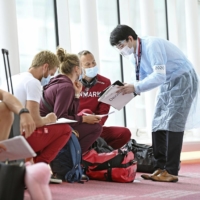Japan will impose tougher rules on athletes and staff participating in the Tokyo Olympics from countries hit by the highly contagious delta variant of the coronavirus, including more rigorous testing and restrictions on coming into contact with other people, the government’s top spokesman said Monday.
The move comes amid concerns the games, set to start July 23, could become a superspreader event. The capital is already seeing infections creep back up just a week after a state of emergency was lifted.
Athletes and staff will be required to be tested every day for a week before coming to Japan, during which time they are to self-isolate, Chief Cabinet Secretary Katsunobu Kato said at a news conference. They will also be forbidden from coming into contact with other people for three days after arriving.
“We will take the necessary border measures while also ensuring athletes are treated fairly in terms of nutrition and training facilities,” Kato said, adding the government is in talks with the International Olympic Committee and the games organizing committee to finalize the rules.
The government’s top COVID-19 adviser, Shigeru Omi, and other infectious disease experts have warned that the combination of the delta variant, first detected in India and believed to be almost two times more transmissible than the original strain of the coronavirus, with an increased flow of people during the games could lead to surge in infections.
Earlier in the day, Prime Minister Yoshihide Suga visited Haneda Airport in Tokyo and was briefed on Japan’s border measures, which have been under scrutiny since a member of the Ugandan Olympic delegation tested positive for the coronavirus upon arriving at Narita Airport near Tokyo on June 19.
The rest of the team was allowed to travel by chartered bus to Izumisano, Osaka Prefecture, where another member was later found to be infected.
Tokyo Organising Committee officials had stated that stricter COVID-19 guidelines were needed in the wake of the incidents.
Athletes and staff will be isolated if they may have been in close contact with someone who has tested positive, taking a separate car to their destination, Kato said.
Suga expressed concern over the recent rise in coronavirus cases in Tokyo, which reported 317 new infections Monday, up from 236 a week ago.
“We must continue implementing anti-virus measures while remaining highly vigilant. … If necessary, we will quickly take additional steps,” he told reporters.
Such steps could include declaring another state of emergency or extending the restrictions on business activities currently in place under a quasi-emergency, which would likely see fewer, if any, spectators at Olympic and Paralympic venues.
In a time of both misinformation and too much information, quality journalism is more crucial than ever.
By subscribing, you can help us get the story right.
SUBSCRIBE NOW



